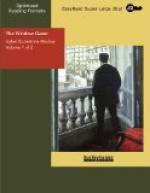“What is it,” asked Mary bluntly, “that you think Professor Spence ought to see?”
This was entirely too blunt for Mrs. Keene. She, in her turn, looked blank. What did Miss Davis mean? She was not aware that she had suggested the professor’s seeing anything. Probably there was nothing at all to see. Young people have such latitude nowadays. She herself was not a gossip. She despised gossip. “What I always say,” declared she, virtuously, “is ‘do not hint thing’s.’ Say them right out and then we shall know where we are. Don’t you think so?”
Mary agreed that, under these conditions also, one might be fairly sure of one’s position in space. “Unless,” she concluded maliciously, “there is anything in the Einstein theory.”
This latter shot had the effect intended, for Mrs. Keene said hurriedly, “Oh, of course in that case—” and moved away.
“I’m going home, Mary,” said Aunt Caroline, coming up. Aunt Caroline had had enough garden party. She had noticed both the rescue of Desire by John, and the conversation of Mary with Mrs. Keene—the “worst old gossip in Bainbridge.”
Desire was quite ready to go. So was Mary. The centre of attraction for them both had shifted itself. John too, felt that he ought to turn up at the office. But all three ladies politely declined a lift home in his car.
“It is so hot,” he pleaded.
“It is not hot,” said Aunt Caroline.
Mary smiled mockingly and murmured something about the great distances of small towns. Desire said, “No, thank you, John,” in her detached way—a way which drove him mad even while he adored it.
So the Burton-Jones garden party faded into history. But history-in-the-making caught up its effects and carried them on. . . .
It was a lovely night. But indoors it was hot with the accumulated heat of the day. Instead of going to bed, Mary slipped out into the garden. It was fresher there, and she was restless. The front of the house lay in darkness, but, from the library window at the side, stretched a ribbon of light. Benis must be still at work. With slippers which made no sound upon the grass, Mary crossed over to the window and looked in.
What she saw there stung her already fretted soul to unreasoning anger, and for once the circumspect Miss Davis acted upon impulse undeterred by thought. Entering the house softly, she ran upstairs to the west room which she entered without knocking.
Desire, seated at the dressing table, turned in surprise. She was ready for bed, but lingered over the brushing of her hair. With another spasm of anger, Mary noticed the hair she brushed—hair long and lustrous and lifted in soft waves. A pink kimona lay across the back of her chair, a pretty thing—but not at all French.
“Put it on,” said Mary, “and come here. I want to show you something.”
Desire did not ask “What?” Nor did she keep Mary waiting. Pleasant or unpleasant, it was not Desire’s way to delay revelation. Together the two girls hurried out into the dew-sweet garden. As they went, Mary spoke in gusty sentences.




